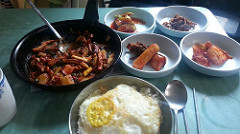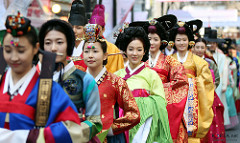Archive by Author
Learn Korean New Trend Posted by Soo on Jun 15, 2015

Have you heard about a marriage rate in your country? If yes, is it getting higher or lower? In Korean, the rate is getting much lower, so living alone became one of Korean cultures. In Korea, there are many old singles b/t 35 to 50 prefers to live by themselves because of a bad economy…
Learn Korean Plain Form in Speech Posted by Soo on Jun 8, 2015

Korean plain form is frequently used in writing and speech. In speech, it is casual statements to friends or talking to oneself. In writing, you will see in the new articles a lot. Let’s compare difference between (어/아)요 and casual statement to your friend. 나 어제 고등학교 친구 만났다/I met a high school friend yesterday…
Learn Korean Future Tense Posted by Soo on Jun 1, 2015

As you learned past tense last week with my blog, you are going to learn future tense. It is also very useful. In my personal opinion most foreigners I know, they adopt to learn future tense easier than past tense. Don’t be frustrating to learn grammar, you will be used to it! There is new…
Learn Korean Past Tense Posted by Soo on May 25, 2015

When you talk about something with your friends, lots of topics are already happened before. In the case, you need to use past tense instead of present tense. Most foreigners learn present tense first. So when they adopt to learn past tense after present tense, they have hard time to change it. Let me give…
Learn Korean “If” and “When” Posted by Soo on May 18, 2015
Some of my students were confused using “If/(으)면” and “when/(을)ㄹ 때” because they can be used in the similar situation. For instance, when you go to the store, please buy me a coke. If you go the store, please buy me a coke. Can you classify what is different between two sentences? We all know…
Learn Korean “Whether (or not)” Posted by Soo on May 11, 2015

“Whether (or not)” is high frequency you need to learn in Korean. The grammar rule is v.s. + (ㄴ/은)지 for present. For instance, I don’t know whether you like it/ 나는 네가 그것을 좋아하는지 모르겠다: 좋아하다 is action verb, so need to add 는지 =좋아하는지. Remember when there is 하다 at the end of verb…
Learn Korean “Only” #3 Posted by Soo on May 6, 2015

Today you will learn the last meaning of “Only” in Korea I prepared for you. This is very high frequency Korean use when they want to express in negative way. In positive way, they will say I only need potatoes/감자만 필요해요, but in negative way I only have potatoes/감자 밖에 없어. The grammar is “Noun…


